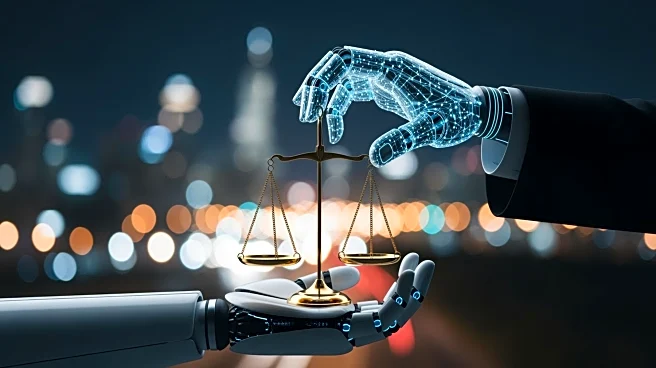What's Happening?
The legal industry is experiencing significant disruptions due to advancements in artificial intelligence (AI) and changing market dynamics. Many law practices are facing challenges as AI-driven layoffs
become more common in various sectors, raising concerns about the future of legal jobs. The COVID-19 pandemic further exacerbated these issues, with many brick-and-mortar law firms closing temporarily or permanently due to reduced client interactions and court closures. Additionally, shifts in client expectations and competition from well-funded environmental groups have led to a decline in certain niche legal markets. Lawyers are now exploring new business models and practice areas to adapt to these changes.
Why It's Important?
The impact of AI and market shifts on the legal industry is profound, affecting both large and small law firms. As AI solutions become more affordable and accessible, clients are increasingly turning to these technologies for legal services, potentially reducing the demand for traditional legal representation. This trend poses a threat to the livelihood of many legal professionals, particularly those in specialized fields that are susceptible to automation. However, it also presents opportunities for innovation and adaptation. Lawyers who can successfully pivot to new practice areas or integrate AI into their services may find new avenues for growth and sustainability. The situation underscores the need for legal professionals to remain agile and forward-thinking in a rapidly evolving industry.
What's Next?
Lawyers and law firms are likely to continue exploring ways to integrate AI into their practices to enhance efficiency and reduce costs. This may involve adopting new business models such as flat fees or subscription services, which can provide more predictable revenue streams. Additionally, there may be a shift towards practice areas that are less susceptible to automation, such as AI ethics, digital estate planning, and fractional general counsel services. Legal professionals will need to engage in continuous learning and experimentation to identify and capitalize on emerging opportunities. Collaboration with technology experts and participation in legal tech forums may also become more common as the industry seeks to navigate these changes.
Beyond the Headlines
The ethical implications of AI in the legal industry are significant, raising questions about the balance between technology and human judgment in legal decision-making. As AI becomes more integrated into legal processes, there will be a need for clear guidelines and regulations to ensure that these technologies are used responsibly and do not compromise the quality of legal services. Additionally, the cultural shift towards more technology-driven legal practices may require a reevaluation of traditional legal education and training to better prepare future lawyers for a tech-centric environment.











